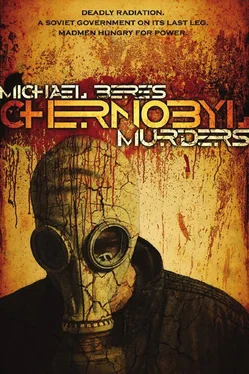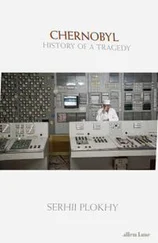Michael Beres - Chernobyl Murders
Здесь есть возможность читать онлайн «Michael Beres - Chernobyl Murders» весь текст электронной книги совершенно бесплатно (целиком полную версию без сокращений). В некоторых случаях можно слушать аудио, скачать через торрент в формате fb2 и присутствует краткое содержание. Жанр: Триллер, на английском языке. Описание произведения, (предисловие) а так же отзывы посетителей доступны на портале библиотеки ЛибКат.
- Название:Chernobyl Murders
- Автор:
- Жанр:
- Год:неизвестен
- ISBN:нет данных
- Рейтинг книги:4 / 5. Голосов: 1
-
Избранное:Добавить в избранное
- Отзывы:
-
Ваша оценка:
- 80
- 1
- 2
- 3
- 4
- 5
Chernobyl Murders: краткое содержание, описание и аннотация
Предлагаем к чтению аннотацию, описание, краткое содержание или предисловие (зависит от того, что написал сам автор книги «Chernobyl Murders»). Если вы не нашли необходимую информацию о книге — напишите в комментариях, мы постараемся отыскать её.
Chernobyl Murders — читать онлайн бесплатно полную книгу (весь текст) целиком
Ниже представлен текст книги, разбитый по страницам. Система сохранения места последней прочитанной страницы, позволяет с удобством читать онлайн бесплатно книгу «Chernobyl Murders», без необходимости каждый раз заново искать на чём Вы остановились. Поставьте закладку, и сможете в любой момент перейти на страницу, на которой закончили чтение.
Интервал:
Закладка:
The grates lined up over the road here.
He could smell diesel fumes. He turned down a path at the edge of the square and saw the grates lined up beneath the lampposts.
He ran past one grate after another and heard a truck starting up, shifting out of first gear, the sound of the truck coming from grates behind him.
Down on his knees, his pistol into the edge of the grate, prying it up. Fingers beneath the grate, the grate pressing into his flesh.
Pushing. Pushing the grate over. The truck’s yellow cab lights below. A trailer so close. A short drop. But how close? How close to the floor of the square? How close to the ceiling of the tunnel?
No choice. He dropped, spread-eagled like a skydiver. He landed on the truck on his chest and, for a moment, could not breathe.
He lay flat, his pistol clenched in his hand. He looked ahead and saw the opening of the tunnel, the road climbing as the truck driver shifted again and the truck lurched forward. And as the truck went faster, the ceiling came closer. Then the ceiling touched him, was at the back of his coat pulling him backward. He would die. He would die.
But suddenly, the echoing sound of the truck’s engine opened up about him, and when he looked up, he knew he was outside the tunnel. The truck, with him onboard like an insect clinging to an automobile windshield, headed west on Khreshchatik and would soon pass the metro station.
“He’s ducked behind a potted plant!” shouted Brovko.
“I saw him turn up there at those benches!” shouted one of the men with a machine pistol.
“Spread out!” screamed Komarov.
A few seconds later, one of the men shouted, “Over here!”
Komarov ran, saw two men standing with their guns lowered.
Could Horvath be dead? Why hadn’t he heard the shot? When he ran closer, all he saw was a hole in the ground, a hole the size and shape of a grave. But this was not ground. There was a street below!
Komarov stopped at the hole, gasping for breath as he looked down with the others at the traffic passing below, the traffic going west.
Despite his gasping, Komarov ran with the others to the west end of Lenkomsomol Square. At the railing, all he could see was the traffic. There was no one running. No one on a car or truck. Did he expect Horvath to stand on whatever car or truck he must have taken for a ride and wave to him? Mock him? Wasn’t it enough he had escaped?
“Back to the hotel!” Komarov gasped for breath. “Find the woman!”
A few meters away, a violinist who had ducked behind a row of benches because of the commotion stood and started playing a Hungarian song. A Gypsy song!
This was too much. Komarov put his pistol away and walked up to the violinist, a somber, skinny wretch of a man in a tattered brimmed hat playing his idiotic tune. Komarov felt the weight of the knife in his pocket as he walked. He stopped before the old man, pulled out the knife, and opened it.
The old man stopped playing. Komarov held the knife underhanded, not certain if he could stop, not certain if he would.
Then he felt a hand grip his wrist. When he turned, he saw it was Captain Brovko. Behind Brovko, Komarov could see insects hovering below the lights lining the square. Beyond the lights was the sparkle of the Dnieper River to the east. How would he be able to blame the Chernobyl explosion on the Gypsy Moth if he could not catch him?
“Come, Major,” said Brovko, staring at the knife. “We might still find the woman.”
Brovko watched as Komarov folded the knife and put it away.
They joined the other men running back to the Hotel Dnieper.
25
On May 14, 1986, eighteen days after the Chernobyl explosion, Gorbachev finally addressed the nation. Seven had died, and 290 were hospitalized. After speaking of the seriousness of the disaster and praising rescue workers, Gorbachev criticized exaggerations by the West. But most importantly, he spoke of the lessons the Chernobyl disaster should teach the world, comparing the disaster to the even greater threats that could be unleashed by nuclear weapons.
A few days after Gorbachev’s speech, the death toll was said to be thirteen, with many thousands exposed to radiation. The fire was out, and construction workers were building a cement tomb around the reactor. Livestock within a twenty-kilometer radius had been destroyed, and other livestock and fields of winter wheat were being monitored. Outside the Soviet Union, Common Market countries banned the import of Ukraine meat and produce.
On Sunday, May 18, a day one would expect to see crowded streets and parks, almost all of Kiev’s children were gone. Perhaps labels appearing on milk containers saying either “For Children” or
“For Adults” had been the final Pied Piper leading children away.
Many parents went south to be with their children, leaving Kiev with its old and middle-aged.
But the world did not stop. There were quotas to be filled and a few extra rubles to be made for those shrewd enough to take advantage. Kiev morning radio quoted a Pravda editorial criticizing Black Sea resort owners who had increased their rates, taking unfair advantage of parents who wanted to be with their children during this difficult time.
Standing at his office window, Komarov watched old men and women wearing dark coats amble out of a church on Boulevard Shevchenko. It reminded him of the night Detective Horvath made fools of his men at the Hotel Dnieper. The Philharmonia had let out, and the crowd gave Horvath the cover he needed. Idiots in the crowd making way instead of stopping him. The same idiots who more than likely applauded Gorbachev’s idiotic Chernobyl speech a few days later in which he warned of the global nuclear threat instead of keeping his mouth shut.
Over a week had gone by, and there was still no clue as to where the two Hungarians had gone. Outgoing airlines, trains, and buses were being watched. Members of the KGB and militia carried photographs of Horvath and Juli Popovics, but still there was nothing.
The militia also wanted Horvath for questioning regarding the poet’s murder because officers had seen the poet talking to Horvath at the roadblock.
Komarov had gone over the scene at the hotel again and again- the time that passed after the knock on the door; the time needed to lower Juli Popovics, still wet from the shower, onto the scaffold; the statue of Lenin holding a pistol; the sofa in front of the window; the gunshot from outside the window; the exit through the hotel kitchen disguised as a waiter; and finally, the escape through the floor of Lenkomsomol Square. But where had Juli Popovics gone?
The search of the hotel after Horvath’s escape had done nothing but upset patrons and prompt calls from both Chief Investigator Chkalov and Kiev’s public prosecutor to Deputy Chairman Dumenko in Moscow. Idiots!
In less than an hour, Dumenko’s flight would arrive in Kiev.
Komarov needed to blame the incident on someone else while convincing Dumenko the case was still worth pursuing. He sent Captain Brovko to Kisbor, telling him Horvath had to go there because his sister-in-law, Nina Horvath, was the one remaining woman with power over him. Brovko’s implication that Komarov had lost control by pulling his knife on the violinist in Lenkomsomol Square made it necessary to get Brovko out of Kiev, and the Horvath farmhouse would be a good place for the captain. Brovko would be in charge of several less skillful agents in Kisbor on the western frontier, including Nikolai Nikolskaia.
The thought of Brovko and Nikolskaia sitting atop a dung heap surrounded by peasants was humorous. But the thought of Dumenko’s arrival made laughter impossible.
“I find it difficult to believe your men would be so easily fooled by a statue!” shouted Dumenko. “Perhaps, if their memory is poor, you might place miniature statues of Lenin on the dashboards of their cars!”
Читать дальшеИнтервал:
Закладка:
Похожие книги на «Chernobyl Murders»
Представляем Вашему вниманию похожие книги на «Chernobyl Murders» списком для выбора. Мы отобрали схожую по названию и смыслу литературу в надежде предоставить читателям больше вариантов отыскать новые, интересные, ещё непрочитанные произведения.
Обсуждение, отзывы о книге «Chernobyl Murders» и просто собственные мнения читателей. Оставьте ваши комментарии, напишите, что Вы думаете о произведении, его смысле или главных героях. Укажите что конкретно понравилось, а что нет, и почему Вы так считаете.












